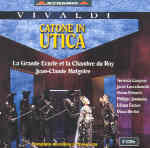This is not the first time this 1735 opera has been recorded. Erato (remember them?) released a 1986 performance under Claudio Scimone that was quite good but in the long run can’t compare dramatically with this live performance from France in November, 2001. In the notes accompanying the earlier release, we learn that only the second and third acts survive and that the first was written by one or more other composers–a sort of patchwork. Scimone, therefore, only presents the acts he believes are by Vivaldi, as evidenced by the autograph score in Turin. Jean-Claude Malgoire claims to have located two of the missing Act 1 arias, takes the music of some others from various Vivaldi operas (and re-sets the words of the Catone libretto, which has been found in Bologna, to that music), and has composed the recitatives “drawing his inspiration from existing Vivaldi compositions.” Scholarship aside, the result gives us lots of terrific music, scored for strings and continuo, but with the occasional addition of two trumpets and two horns (in the extant Vivaldi), and oboes and recorders in the Act 1 reconstruction.
If the truth be known, the plot stands very well with just the last two acts; the libretto of the first is exposition. The opera concerns the Republican Cato’s (tenor) refusal to give in to Caesar (male soprano), who has killed Pompey and taken over Rome. Pompey’s widow Emilia (soprano) actually is the piece’s villain–her hatred for Caesar keeps everyone’s feelings toward him inflamed and she tries to manipulate his death. Cato’s daughter Marzia (soprano) loves Caesar, but he (Cato) wants her to marry Arbace, his ally. This is a real problem. And Caesar’s ally, Fulvio, loves Emilia, although he may just be covering his bets–a confusing bonus. Metastasio, the librettist, wanted Cato to die onstage in his daughter’s arms but opted for him to die off stage and have Marzia report it. Even that was too strong for 18th century Verona, so he recast it with a happy ending: after Cato’s army is defeated Caesar spares Cato in order to gain Marzia’s love, Emilia leaves in disgrace after swearing revenge, Arbace is unhappy but realizes that the outcome is good for the country, and peace returns. The final chorus is suitably unconvincing, and I bet Vivaldi knew it. He scored the soprano Caesar’s vocal line so low that there’s no real enthusiasm; the music is like an editorial commentary.
Up to then, however, the characters’ feelings are ablaze and realistic, with impressive arias and huge drama in the recitatives. Malgoire is particularly good in the dramatic, realistic pacing of the recitatives, but the arias also are well accompanied, and if Malgoire is responsible for the embellishments in the da capo sections of arias, then he is to be further congratulated. His period-instrument band plays beautifully, with the trumpets braying nobly, the strings smooth or cutting as the text requires, and the ensemble work first class.
The singing doesn’t let us down either: Simon Edwards’ Cato is an aristocratic ruler, but he’s capable of great fury against poor Marzia, with whom he becomes enraged for her love of Caesar in both Acts 1 and 2. He handles the role’s coloratura well. Marzia is a sappy ingénue with pretty, lachrymose arias, though at least the one in the last act is energetic (and her interjections of “O Dio! Pieta!” in Cato’s last Rage Aria are enchanting in their sincerity).
Emilia has two furious arias and wicked recitatives, and Veronica Cangemi, in this all-over-the-place-vocally-and-dramatically role, makes you sit up and listen to her scorn. She’s spectacular. Sympathetic Caesar, sung by male soprano Jacek Laszczkowski, is expressive and has the difficult music–trills, leaps, pianissimos, high B-flats–fully in hand. Male alto Philippe Jaroussky is good in the nowhere role of Arbace, and the same can be said about Diana Bertini as Fulvio, an even weaker character. If you love Baroque opera, or may want to, this is top-of-the-line. And whether or not Malgoire is right about his reconstruction of Act 1, it’s nice to have another 50-something minutes of well-performed Vivaldi to savor.
































